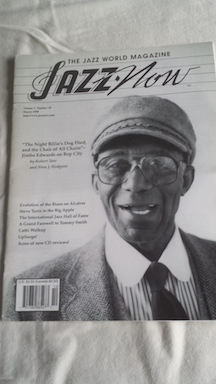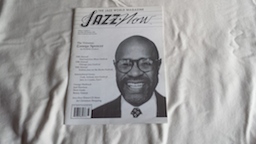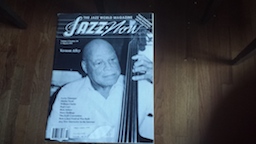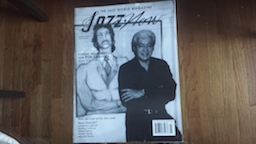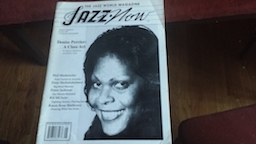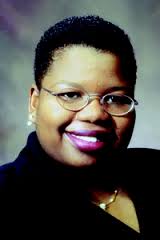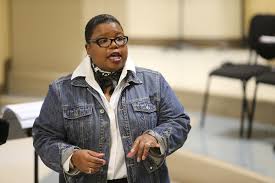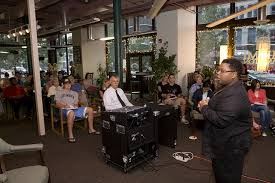The number of black publication efforts on behalf of jazz has been quite modest when one considers the number of jazz publications in the aggregate sense. Currently the most notable – and noble – effort in that regard is Jo Ann Cheatham’s valiant, virtually one-woman effort at continuing to publish her Pure Jazz magazine out of Brooklyn. One recalls such valiant efforts as The Soul & Jazz Record back in the 70s. The 70s and 80s also saw Jim Harrison’s extensive tabloid, the Jazz Spotlite News with its decidedly New York-centric gaze, or the largely regional orientation of Strictly Jazz coming from Atlanta in the early 90s, and Be-Bop And Beyond in the late 80s. Full confession, this writer is most familiar with those publications from both a reader and an eager contributor’s viewpoint.
In the 90s, at the encouragement of the late KPFA (the Pacifica network’s Berkeley, CA flagship station) programmer Doug Edwards and the magazine’s publisher Haybert Houston, I became a regular contributor to Houston’s Bay Area based magazine, Jazz Now. For the most part our ongoing Ain’t But a Few of Us dialogues have focused on the relatively spare number of African American jazz writers, from freelancers to columnists, regular contributors, and authors. An exception was our dialogue with Jo Ann Cheatham, which focused primarily on her Pure Jazz magazine, an installment which will post later this summer. In the meantime I recently re-connected with Haybert Houston by telephone for the following dialogue on the subject of his decidedly grassroots – in every sense of that term! – efforts at publishing Jazz Now, a dialogue which absolutely revealed yet another side of the Ain’t But a Few of Us coin.
HAYBERT HOUSTON (Jazz Now magazine founder)
Independent Ear: When did you start Jazz Now magazine?
Haybert Houston: I started the magazine in May of 1991. It was just [wife] Stella and I and we actually started working towards publishing the magazine in 1987.
IE: What happened in the ensuing years?
HH: The print edition was first [published] in May of 1991. In 1994 we introduced the first interactive jazz magazine on the internet. We were the first, and it ran simultaneously with the print edition until the print edition stopped in March 2000. The electronic edition continued until ’06. We were actually publishing from ’91 to 2006.
IE: What was your original motivation for beginning the magazine?
HH: I looked around at the jazz magazines we had, and you know DownBeat was the model because it had been around for so long. And what I found was the magazines like JazzTimes and even DownBeat, they talked about the big names all the time; they talked about the names that people all over the world would recognize, the “leaders” of the jazz world. But I knew – just from being here in the [SF] Bay Area – there were millions of jazz musicians making a contribution to the art form that were not being recognized and some of them were older than DownBeat!
IE: In addition to closing that disparity was there a desire on your part to address any racial or cultural disparities in jazz magazine publishing?
HH: I knew that black [musicians] were making major, major contributions to the art form, and a lot of these people… like Robert Porter for example, a trumpeter here in the Bay Area who was a very active organizer of all kinds of musicians in general, and this guy had never been recognized by anybody outside of our area, and he was a black man. I knew his chances of getting in DownBeat or JazzTImes was almost nil; that would never happen no matter what he contributed. So the racial issue was very strong.
I never told anybody [writers] to highlight black people, but I was looking at the cultural contributions, as a publisher, and I wanted to remind the people of that – that these were the people laying the ground work who had made the major contributions and were heads of organizations throughout the country, and the people hadn’t heard of the organizations let alone the musicians.
IE: In addition to feeling that certain musicians’ contributions had been underserved in the jazz media, you felt compelled by the fact that certain black musicians contributions had been ignored?
HH: Exactly! And that was obvious to anybody that you talked to. If you talked to people around the world about that – just asking them who’s making jazz contributions in their area – 99.9% of those people were black. But you had to be a Monterey Jazz Festival performer, or something along those lines, in order for you to get mentioned [in the mainstream jazz publications].
IE: Before you started the magazine, had you written about jazz previously?
HH: No, I had not written anything, so we were real amateurs and that was very difficult, but we managed.
IE: So how did a couple like you and Stella, who had no particular journalistic experience, how did you motivate yourselves to develop a magazine?
IE: When I decided to go for it I started looking for basic ways to publish a magazine. We’ve got colleges and universities all over the world, but I could not find a thing about what you do to publish a magazine; there were no instructions anywhere, nothing that said if you want to publish a magazine this is what you do, I couldn’t find that [information] anywhere. So I had to go from scratch, to figure out how to publish. And not only that, at the time we started in 1991 we were in a transition period, the world was moving from the pre-computer stage to everything going to desktop [publishing].
So we went to the College of Alameda, took a course in computer technology. After we learned how to use the computer I told the instructor what we wanted to do, I told him the reason we were there was because I was planning to publish a magazine. I asked him what did he suggest I do using the computer sciences and equipment? He said, the first thing I needed to do was start on Apple, to use MacIntosh. So I went back to college to Laney, which is here in Oakland, and I took desktop publishing on Apple MacIntosh. We bought the equipment and we were off and running. We were setting ouR own rules, but I got a lot of help.
I reached out to everybody I knew. My cousin lives in Chicago and I knew that Johnson Publications was there in Chicago and we met with a lady there. I told her what I was gonna do and asked for her help. She suggested that I contact Playboy, because Playboy was the master of magazine distribution. I knew that they distributed their own magazine, but they had a network that distributed most magazines. So that’s how I got the magazine distribution, and it was so helpful because not only did [Playboy] get the magazine out in this country but they hooked me up with Tower Records, which was worldwide and Tower got my magazine in Taiwan and other places that there was no way I could have gotten the magazine otherwise. That’s how – seeking and asking and begging for help – I managed to do that, and we took off.
IE: At its peak what were Jazz Now’s publishing numbers?
HH: They were not where I felt they should have been, but they were sufficient to get us around the world. We had about 20,000 subscribers; by the time we got to that point the internet was taking off and I can’t remember how we tracked the internet numbers, which was a very big issue also.
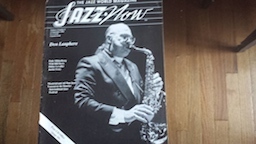
IE: How did you go about attracting subscribers?
HH: In the various areas that we covered, I would ask people where did they purchase their magazines, where do you get DownBeat, etc. to find out how those people were connected to the jazz world. And we had questionnaires in the early editions that helped a bit, but it was mostly word of mouth that helped with Jazz Now.
IE: Were you aware at the time that you were the only African American publishing a monthly jazz magazine?
HH: I wasn’t when I started; I kept hearing that, but I wasn’t aware because I had no way of checking that out and I didn’t want to make that claim and have somebody say ‘oh, I’ve been publishing my little newsletter for a hundred years…’ So we never made that claim. Others made that claim for me very often, but I never made that claim because I couldn’t verify it.
IE: How did you go about recruiting writers for the magazine?
HH: I’ll give you an example. I went to most of the jazz shows in my area and there was a lady that I would see at every one of those events. She was a white lady who would be sitting up front, very clean, very sharp, blond hair with a bun in the back looking very conservative. But she was nodding her head with all the music, so I thought ‘this lady is really into the music, she’s always here.’ I found out who she was and I talked with her and I found out that she had been taking pictures at all these different events, so I asked her had she ever considered writing. She said ‘no, I’ve never thought about writing [about the music], this is just for me.’ I finally convinced her. Then I found out about people in the [jazz] community and asked if they knew of anybody writing about jazz and whether they could recommend anybody, and some people would, but it was just kind of a hit & miss, word of mouth thing, it was very basic, we didn’t have headhunters or anything like that.
IE: Did you find in your early experience starting this magazine, in trying to find writers, did you find that there were a number of African Americans writing about jazz?
HH: No, I didn’t find that there were a lot, but I did find some and some of the [black writers] that were writing about it didn’t think that we would last, so they were not interested. So I would have to work really hard to convince somebody that I wanted to write for the magazine. Doug Edwards, a radio broadcaster at KPFA, really helped me a lot; in fact he was with the magazine right up until he died. One of the first articles that we published was about Pearl – of Jazz at Pearls club in San Francisco… I got this guy, a young black guy, to do that article on Pearl for the first issue, and I think he charged me something like $600, which was way more than I could afford, but I had no way of finding out how much people were getting paid until I met with that woman at Ebony.
So the guy over-charged me and I thought ‘wow, I’ve gotta find a better way to do this.’ Doug Edwards told me to tell people that we were a poor magazine, that we would pay them $25 an article; I did that and people agreed because most of the people wanted to write and it wasn’t really about the money.
IE: So as soon as you were able to you did pay writers?
HH: Oh yeah, I paid writers from that time forward, but I just couldn’t pay them very much. I paid them $25 an article and they were happy with that. I was surprised that they were happy with that because for $25 you can’t buy a pack of cigarettes!
IE: Were you able to attract other black writers to the magazine?
HH: Yes I was and I was so pleased with that. We attracted some really good writers; I think of Elizabeth Goodwin, who was writing for somebody else before I got her. She was a very conservative young woman, but very smart and articulate and had some writing experience. She did a number of interviews throughout the history of the magazine. When I would find somebody that was a writer, I would try to convince them to write for us and in most cases they would.
IE: Did you find an openness, as far as black writers being willing to contribute because of who you were as far as publishing this magazine?
HH: Yes, I was happy about that. A lot of [black writers] said ‘I see where you’re going, don’t worry about trying to pay me,’ and that was very helpful, that made me feel good that I was getting some help. It was very difficult to do what we were doing because #1 I had to pay the printer and I did. I finally got this guy who was going to generate some revenue through advertising and that lasted for a few years but it never really generated enough to cover the cost, so it was really hard to get the advertising support that the magazine demanded and required. So it was hard, but I got a lot of help, and sometimes individuals would give me money for the magazine.
IE: Were these donors black people?
HH: These were primarily black people, but some of them were white. I worked for a company called United States Leasing International. The guy I worked for in that organization, who was a vice president, he gave me about $9,000 [for the magazine], which was just wonderful.
IE: Before you started Jazz Now magazine were you at all aware that there were few African Americans writing about jazz?
HH: I didn’t know who they were, I knew that there had to have been [black writers] but I couldn’t identify anybody. These [black writers] would be introduced to me or referred to me, but I didn’t know a lot of jazz writers at that time.
IE: Why do you suppose its always been such a glaring disparity where you have so many black musicians contributing to the music but so few black people writing about it and black folks in the media in general dealing with the music?
HH: If you look at the publishing industry as a whole, I think that’s where the disparity arises; that’s why I went to Ebony because they had been publishing for years, and they helped me so much. I just chose to go to where I knew there were black writers because I didn’t know of black jazz writers, not just writers but publishers. She didn’t make too many writer recommendations to me, but she helped me in many other ways.
I didn’t know how to find black writers unless they came to me. After the magazine came out, black writers would come to me saying they wanted to write. Most of our writers were new people in the industry who hadn’t written for magazines before but they wanted to and they wanted to make a contribution, or they knew something. Like that lady I mentioned, I would recruit them based on what I thought they could do.
IE: As you sought to provide coverage to underserved jazz musicians, did you think the dearth of African American jazz writers contributed to how the music was covered?
HH: My first answer to that is no, because those writers that were writing on jazz at that time – editors decide what goes in and what does not – a lot of writers had run into [reluctant editors]. They would submit articles and they would get turned down, unless they were huge names. Editors would tell writers that their writing about Joe Blow from Wilson Creek, nobody’s going to buy the magazine, and the writers would tell me about that!
IE: So once you got into publishing, those issues that motivated you as far as your feeling so many contributing jazz musicians were not getting magazine coverage, did it ever occur to you that the way the music was covered had anything to do with the fact that there weren’t a lot of black writers covering the music?
HH: Without a doubt, very strongly! The writers told me that, and when I say the writers I’m only talking about professional writers. Some of them, they wouldn’t even bother, saying ‘no man, I can’t tie up my energies in something that isn’t going to go anywhere [meaning Jazz Now]. That was shocking and it made it very difficult, but that’s what I was trying to overcome, to change all of that. I felt that to a degree we did gather some recognition and we did change some of that. We had some [black] writers that started with me, they grew up with me, and then they started to go over to other magazines and radio broadcasting but they always kept us in mind and knew that [Jazz Now] was where they came from.
IE: So you got a sense that to a certain degree Jazz Now served as a bit of an incubator?
HH: Oh absolutely, I could see it. We made a difference in the publishing world, I could see that, and I could hear that people recognized what we were trying to do, and we got a lot of support along those lines.
IE: What difference do you feel Jazz Now made?
HH: There was an organization in Germany, the Jazz Institute [in Darmstadt], and this guy was so thrilled that I started the magazine that he helped in any way he could. I had a relationship with him and he told me about the struggle that he had, but he was very, very helpful to me. I got a lot of information from them and also learned a lot.
IE: What is your sense of the indifference of so many African American publications towards jazz music, despite the historic origins of the music?
HH: Not everybody appreciates the art form for what it has contributed. A lot of black folks were church-oriented and the way jazz was originally introduced, where it played out, at one point jazz was looked down upon as a dirty music, it was thought of as just bawdy house music. I’m not sure why we didn’t have more coverage in black publications.
IE: As you continued to cover the music in Jazz Now, what were some of your most rewarding encounters?
HH: When we would get recognition from places like the Monterey Jazz Festival. I got to know those people really well, they supported us and would give us heads-up notice about whatever was going on, and asked us to cover it and go to their shows. From most of the jazz community we were welcomed.
IE: Not only were you the rare African American publishing a jazz magazine, but you were rare geographically [California-base] because there weren’t a lot of jazz publications coming out of the West.
HH: That’s true.
IE: Was that also part of your motivation for publishing?
HH: Oh yes it was. You might remember, the magazine used to say California Jazz Now, the West Coast jazz world, and that was because we knew there was no jazz magazine out here. DownBeat was in [Chicago} and any coverage of the guys in the West was limited.
IE: Did you find a sense of openness from black musicians wanting to assist or be more open to your publishing venture?
HH: I’m happy to say that I did find that. There was a bass player here named Harley White who had an organization that recognized Jazz Now many times. Harley White played bass for Earl “Fatha” Hines. His organization was called Jazz Preservation Society and he gave me an award. His recording secretary was Ed Kelly, one of the most admired piano players on this side of the country, he’s no longer with us but he was great.
IE: So there was some expression of pride amongst black people in the music for the fact that you were doing this.
HH: Yes, there was, and they knew what a struggle it was. People in the jazz community tried to support Jazz Now as best they could.
IE: As you look back on what you were able to achieve with the magazine, what would you say about the whole experience?
HH: It was a very enlightening and rewarding experience, and we’re not talking monetary rewards here. But it was very rewarding; I got to find out that what I’d imagined was true – and that is that there are some truly remarkable musicians who weren’t being covered, and when we got somebody to cover them they were elated to know that we were around – and I’m talking about white musicians in Sweden, or white musicians in Australia – it wasn’t just the black musicians that recognized what we were doing about accentuating those musicians who had been around but had gotten no recognition. People really thought that was a great idea; it never turned around monetarily but we got a lot of praise.
IE: What was your level of commercial success, in sustaining the magazine financially?
HH: We never publicized this and never talked about it at all – but at one point Stella and I had to declare bankruptcy because I was going overboard in my support and I wasn’t getting the kind of return in order to make it viable. So it was never really a monetary success, most of the time it maintained its own, but then there was a time when it was very, very difficult.
IE: At what point did you evolve Jazz Now into purely an online presence?
HH: When we first got into the 20,000 subscriber range it became much more difficult to publish hard copy, so we reverted to the electronic issue, which we had going at the same time as the [hard copy issue], but the printed issue required a lot of time and money.
IE: Did you say you were the first jazz magazine to publish online?
HH: Yes, we were.
IE: How was it that you became an early adapter to what is now common practice?
HH: I found out that no matter what medium I was using, where I was lacking was a professional advertising person who knew how to generate the revenue. One time my editor, Bob Tate, said ‘you need to pay the advertising guys more. When he made that statement I knew that he didn’t know any more . The advertising guy was supposed to generate the revenue for [Bob] to get paid and he didn’t understand that.
IE: Did you have advertising in your online publication?
HH: Oh yes, I had ads there, and subscriptions, and we had a catalogue of releases there and we would get the musicians to advertise their releases. That helped a lot but not enough to sustain the magazine. It made me feel so good to publish the magazine, to know that I had done something for the art form; I would do it again at the drop of a hat.

